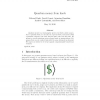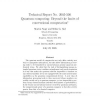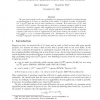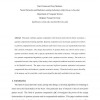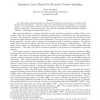CORR
2010
Springer
15 years 28 days ago
2010
Springer
Quantum money is a cryptographic protocol in which a mint can produce a quantum state, no one else can copy the state, and anyone (with a quantum computer) can verify that the sta...
120
click to vote
PAAPP
2007
15 years 1 months ago
2007
The quantum model of computation not only o ers entirely new ways to manipulate information, but also allows information processing tasks to be formulated in unconventional, genui...
146
click to vote
ISCI
2008
15 years 1 months ago
2008
Most modern cryptographic studies design cryptosystems and algorithms using mathematical concepts. In designing and analyzing cryptosystems and protocols, mathematical concepts ar...
152
click to vote
CORR
2010
Springer
15 years 1 months ago
2010
Springer
Quantum Cryptography or Quantum key distribution (QKD) is a technique that allows the secure distribution of a bit string, used as key in cryptographic protocols. When it was note...
140
click to vote
SIAMCOMP
2002
15 years 2 months ago
2002
Linear quantum cellular automata were introduced recently as one of the models of quantum computing. A basic postulate of quantum mechanics imposes a strong constraint on any quan...
119
Voted
CORR
1998
Springer
15 years 2 months ago
1998
Springer
We prove lower bounds on the error probability of a quantum algorithm for searching through an unordered list of N items, as a function of the number T of queries it makes. In par...
120
Voted
ISCI
2000
15 years 2 months ago
2000
This paper combines quantum computation with classical neural network theory to produce a quantum computational learning algorithm. Quantum computation uses microscopic quantum lev...
165
click to vote
CORR
2002
Springer
15 years 2 months ago
2002
Springer
Abstract: Although a quantum state requires exponentially many classical bits to describe, the laws of quantum mechanics impose severe restrictions on how that state can be accesse...
134
click to vote
CORR
2002
Springer
15 years 2 months ago
2002
Springer
One of the earliest quantum algorithms was discovered by Bernstein and Vazirani, for a problem called Recursive Fourier Sampling. This paper shows that the Bernstein-Vazirani algo...
141
click to vote
CORR
2000
Springer
15 years 2 months ago
2000
Springer
The complexity of quantum computation remains poorly understood. While physicists attempt to find ways to create quantum computers, we still do not have much evidence one way or t...
